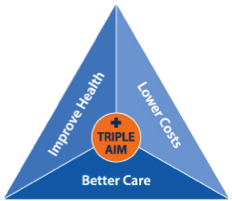Update on the Cleveland Clinic’s new space and evolving model
January 24, 2017
by John Weeks, Publisher/Editor of The Integrator Blog News and Reports
 The business journal Crain’s Cleveland was not hot and bothered about the recent skirmish over integrative medicine and vaccinations at the Cleveland Clinic. In their January 22, 2016 issue, the publication cast its sights in a friendlier, if surprisingly-named direction: Cleveland Clinic’s Holistic Center on Rapid Ascent. The article provides insights into the nation’s most significant pilot project in a focused form of “holistic” care: the Cleveland Clinic's Celia Scott Weatherhead Center for Functional Medicine.
The business journal Crain’s Cleveland was not hot and bothered about the recent skirmish over integrative medicine and vaccinations at the Cleveland Clinic. In their January 22, 2016 issue, the publication cast its sights in a friendlier, if surprisingly-named direction: Cleveland Clinic’s Holistic Center on Rapid Ascent. The article provides insights into the nation’s most significant pilot project in a focused form of “holistic” care: the Cleveland Clinic's Celia Scott Weatherhead Center for Functional Medicine.  The 17,000-foot center—twice the size of its present location—is in the heart of Cleveland Clinic’s main campus. It incorporates softening, naturalistic features “from floor to ceiling” such as natural light and air, wood touches, fine art, and noise reduction. Tawny Jones, the center's administrator and designer of the new space explains: "When you talk about thinking about the holistic approach and really looking at the entire body and looking at optimal health, you have to think about all of these features that affect that, so that's what we did in this space." The buildout is supported through the Weatherhead Foundation, founded by Albert and Celia Weatherhead (pictured). Albert died in 2011. The foundation has also funded such entities as an international center at Harvard and an East Asian Institute at Columbia. The article does not note the size of the financial commitment. While the headline writer didn’t feel a need to distinguish “holistic” from “functional,” writer Lydia Coutre’ offered an attractive definition of the latter: “Functional medicine is based on the evidence that lifestyle factors, such as nutrition, sleep, exercise, stress, relationships and genetics, contribute to disease.” With little advertising, the center has seen and anticipates explosive growth—from 4,200 visits from 1400 patients in 2016 to an expected 14,000 in 2017. New practitioners have already been prepared for the move in, to begin to treat the 3,000 patients on the wait list. The clinical practice model begins with a significant commitment from the patient: 3-4 hours filling out a medical history questionnaire. Then, during the first visit, patients spend an hour with the functional medicine physician, an hour with a nutritionist, and 15 to 30 minutes with a health coach. Afterward, a medical assistant helps the patients recap of the experience then helps them with next steps. The offices are organized into pods with no spatial barriers between practitioners.
The 17,000-foot center—twice the size of its present location—is in the heart of Cleveland Clinic’s main campus. It incorporates softening, naturalistic features “from floor to ceiling” such as natural light and air, wood touches, fine art, and noise reduction. Tawny Jones, the center's administrator and designer of the new space explains: "When you talk about thinking about the holistic approach and really looking at the entire body and looking at optimal health, you have to think about all of these features that affect that, so that's what we did in this space." The buildout is supported through the Weatherhead Foundation, founded by Albert and Celia Weatherhead (pictured). Albert died in 2011. The foundation has also funded such entities as an international center at Harvard and an East Asian Institute at Columbia. The article does not note the size of the financial commitment. While the headline writer didn’t feel a need to distinguish “holistic” from “functional,” writer Lydia Coutre’ offered an attractive definition of the latter: “Functional medicine is based on the evidence that lifestyle factors, such as nutrition, sleep, exercise, stress, relationships and genetics, contribute to disease.” With little advertising, the center has seen and anticipates explosive growth—from 4,200 visits from 1400 patients in 2016 to an expected 14,000 in 2017. New practitioners have already been prepared for the move in, to begin to treat the 3,000 patients on the wait list. The clinical practice model begins with a significant commitment from the patient: 3-4 hours filling out a medical history questionnaire. Then, during the first visit, patients spend an hour with the functional medicine physician, an hour with a nutritionist, and 15 to 30 minutes with a health coach. Afterward, a medical assistant helps the patients recap of the experience then helps them with next steps. The offices are organized into pods with no spatial barriers between practitioners.  Mark Hyman, MD, eirector of the center and wellness expert says, "I think people are understanding that there are limits to drugs and surgery for treating chronic diseases. People are understanding there are causes that are really driving the chronic illness that we need to deal with.” The article includes a lengthy patient story, and quotes this reflection from the patient as well. “It's a huge commitment. You have to change the rest of your life—everything, your whole lifestyle to gain good health," they said. The functional medicine clinic has been a huge draw. The center has thus far seen patients from 17 countries and 42 states. Of these, 25 percent were new to the Clinic entirely. In 2016, the center saw 1,400 new patients.
Mark Hyman, MD, eirector of the center and wellness expert says, "I think people are understanding that there are limits to drugs and surgery for treating chronic diseases. People are understanding there are causes that are really driving the chronic illness that we need to deal with.” The article includes a lengthy patient story, and quotes this reflection from the patient as well. “It's a huge commitment. You have to change the rest of your life—everything, your whole lifestyle to gain good health," they said. The functional medicine clinic has been a huge draw. The center has thus far seen patients from 17 countries and 42 states. Of these, 25 percent were new to the Clinic entirely. In 2016, the center saw 1,400 new patients.  Comment: The functional medicine model as begun at Cleveland Clinic was based on a practitioner “pod” of a functional medicine MD, a health coach, and a nutritionist, around which the space has been designed. The article notes that there is an important addition of two spaces in the new facility for behavioral health practitioners. The writer also notes that the “the providers sometimes refer patients to alternative medicine services—such as acupuncture, yoga, Chinese herbal medicine and others.” At the end of the article, Hyman framed the initiative in the context of the move to move the medical industry toward a focus on outcomes and value. "Right now,” he is quoted as saying, “we're paying for volume in health care instead of value. That's shifting, and we believe we're a key part of the solution." Notably, leaders of most of the major integrative medicine centers also see themselves as better aligned with the value direction. The Cleveland Clinic team recognizes, according clinic director Jones, that research into the cost-effectiveness of the model is the "linchpin" of the practice’s future.
Comment: The functional medicine model as begun at Cleveland Clinic was based on a practitioner “pod” of a functional medicine MD, a health coach, and a nutritionist, around which the space has been designed. The article notes that there is an important addition of two spaces in the new facility for behavioral health practitioners. The writer also notes that the “the providers sometimes refer patients to alternative medicine services—such as acupuncture, yoga, Chinese herbal medicine and others.” At the end of the article, Hyman framed the initiative in the context of the move to move the medical industry toward a focus on outcomes and value. "Right now,” he is quoted as saying, “we're paying for volume in health care instead of value. That's shifting, and we believe we're a key part of the solution." Notably, leaders of most of the major integrative medicine centers also see themselves as better aligned with the value direction. The Cleveland Clinic team recognizes, according clinic director Jones, that research into the cost-effectiveness of the model is the "linchpin" of the practice’s future.



















SHARE